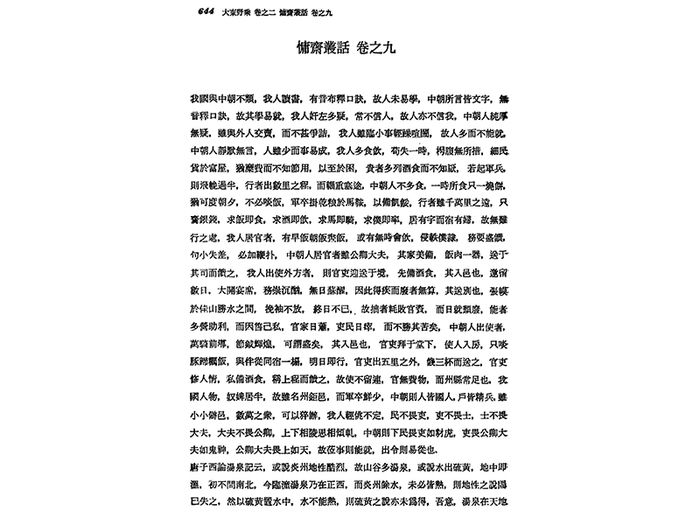(Translation) 成俔 文明論
| Primary Source | ||
|---|---|---|
 |
Title | |
| English | ||
| Chinese | 文明論 | |
| Korean(RR) | 문명론(Munmyeongnon) | |
| Text Details | ||
| Genre | Literati Writings | |
| Type | ||
| Author(s) | 成俔 | |
| Year | ||
| Source | Korean Classics and Literati's Collection of Writings (한국고전종합DB) | |
| Key Concepts | ||
| Translation Info | ||
| Translator(s) | Participants of 2019 JSG Summer Hanmun Workshop (Advanced Translation Group) | |
| Editor(s) | ||
| Year | 2019 | |
목차
- 1 Introduction
- 2 Original Script
- 3 Discussion Questions
- 4 Further Readings
- 5 References
- 6 Translation
- 6.1 (sample) : Jaeyoon Song
- 6.2 Student 1 : Yishu Ma
- 6.3 Student 2 : Samuel Sai Hay Chan 陳世熙 진세희
- 6.4 Student 3 : Younès M'Ghari
- 6.5 Student 4 : King Kwong Wong
- 6.6 Student 5 : (신동조)
- 6.7 Student 6 : Stacey
- 6.8 Student 7 : Russell Guilbault
- 6.9 Student 8 : Q
- 6.10 Student 9 : Yeonjae Ra
- 6.11 Student 10 : (Kanghun Ahn)
- 6.12 Student 11 : (Write your name)
- 6.13 Student 12 : (Write your name)
Introduction
Original Script
| Classical Chinese | English |
|---|---|
|
我國與中朝不類。我人讀書。有音布釋口訣。故人未易學。中朝所言皆文字。無音釋口訣。故其學易就。我人奸巧多疑。常不信人。故人亦不信我。中朝人純厚無疑。雖與外人交賣。而不甚爭詰。我人雖臨小事輕躁喧鬧。故人多而不能就。中朝人靜默無言。人雖少而事易成。我人多食飮。苟失一時。枵腹無所措。細民貸於富屋。猶糜費而不知節用。以至於困。貴者多列酒食而不知厭。若起軍兵。則飛輓過半。行者出數里之程。而輜重塞途。中朝人不多食。一時所食只一燒餠。猶可度朝夕。不必啖飯。軍卒掛乾粮於馬鞍。以備飢餒。行者雖千萬里之遠。只齎銀錢。求飯卽食。求酒卽飮。求馬卽騎。求僕卽率。居有宇而宿有婦。故無難行之處。我人居官者。有早飯朝飯晝飯。或有無時會飮。侵軼僕隷。務要盛饌。句小失差。必加鞭扑。中朝人居官者雖公卿大夫。其家美備。飯肉一器。送于其司而饋之。我人出使外方者。則官吏迎送于境。先備酒食。其入邑也。邀留數日。大開宴席。務祟沈酗。無日蘇醒。因此得疾而廢者無算。其送別也。張幙於佳山勝水之間。挽袖不放。終日不已。故拙者耗敗官資。而日就頹廢。能者多營助利。而因售己私。官家日蕭。吏民日瘁。而不勝其苦矣。中朝人出使者。萬騎前導。節鉞輝煌。可謂盛矣。其入邑也。官吏拜于堂下。使人入房。只啖豚蹄糲飯。與伴從同宿一榻。明日卽行。官吏出五里之外。餞三杯而送之。官吏欲修人情。私備酒食。稱下程而饋之。故使不留連。官無費物。而州縣常足也。我國人物。奴婢居半。故雖名州鉅邑。而軍卒鮮少。中朝則人皆國人。戶皆精兵。雖小小僻邑。數萬之衆。可以猝辦。我人輕佻不定。民不畏吏。吏不畏士。士不畏大夫。大夫不畏公卿。上下相陵思相傾軋。中朝則下民畏吏如豺虎。吏畏公卿大夫如鬼神。公卿大夫畏上如天。故莅事則能就。出令則易從也。 |
(translation) |
Discussion Questions
Further Readings
References
Translation
(sample) : Jaeyoon Song
- Discussion Questions:
Student 1 : Yishu Ma
- Discussion Questions:
-As this article takes China as an idealized model, how did people during the 15th-16th century Joseon understand their own culture? Are there any other literati writings which could give us further information?
Student 2 : Samuel Sai Hay Chan 陳世熙 진세희
- Discussion Questions:
What do you think is the point of 成俔 tried to make in the essay? Is his depiction of China and Korea fair and trustworthy? If not, what is the reason of him depicting the two countries in such ways?
Student 3 : Younès M'Ghari
- Discussion Questions:
Were the author's representations towards China and Korea widely spread among Korean scholars? Even across the opposite political factions of the time?
What would have been the king's reaction if he could have read this text?
Who compiled this text, when and for what purpose? What kinds of texts precede and follow it in that compilation?
Student 4 : King Kwong Wong
- Discussion Questions:
Why did Sŏng Hyŏn (Seong Hyeon) write an essay comparing the Chosŏn (Joseon) people and the Chinese people? What did he want to achieve with this writing?
Student 5 : (신동조)
- Discussion Questions:
How reasonable or compelling of his writing? Is his statement on the cases of the Ming acceptable, apart from its effect as a writing strategy? Is it a philosophical thesis or rhetorical leaflet?
Student 6 : Stacey
- Discussion Questions:
What were the motivations behind this piece? Do you think the author is equally critical and reverent of Choson and Ming China, respectively, or is he idealising one in order to create a greater contrast?
Describe the relationship between China and Choson during the time of this text.
Student 7 : Russell Guilbault
- Discussion Questions:
- Seong Hyeon's criticism of the social/political organization of Joseon, compared to the Ming, seems to me to echo Gim Siseup's emphasis on the importance of 'myeongbun' 名分. Both Seong Hyeon and Gim Siseup believe a strictly enforced system of distinctions between various social ranks & positions is necessary for a country to be properly governed. I'd like to do some more looking into how important this concept was & how widely it circulated among literati during this period.
Student 8 : Q
- Discussion Questions:
Entertaining the possibility that all of our authors may be writing with intended ambiguities or hidden agenda. In case of 성현, what would be the reasonable limit of research determining or eliminating the possibility of such hidden agenda?
Student 9 : Yeonjae Ra
- Discussion Questions:
1. how the title “文明論” can be translated? (discussion of the civilization?) 2. why he only writes about the difference between choseon and ming dynasty? when we see the articles of 燕行使(usually 燕行錄), there are lots of contents dealing with the folk customs. are there some limitations to 朝天使 at early choseon period?
Student 10 : (Kanghun Ahn)
How accurate are Song Hyon's observations of China vis-a-vis the real China at the time?
Is it really a good rhetorical strategy to draw upon such a black and white logic to criticize one's own society?
Was it really prevalent, among Choson literati, to utilize the idealized portrayal of China in order to criticize Choson society?
Student 11 : (Write your name)
- Discussion Questions:
Student 12 : (Write your name)
- Discussion Questions: